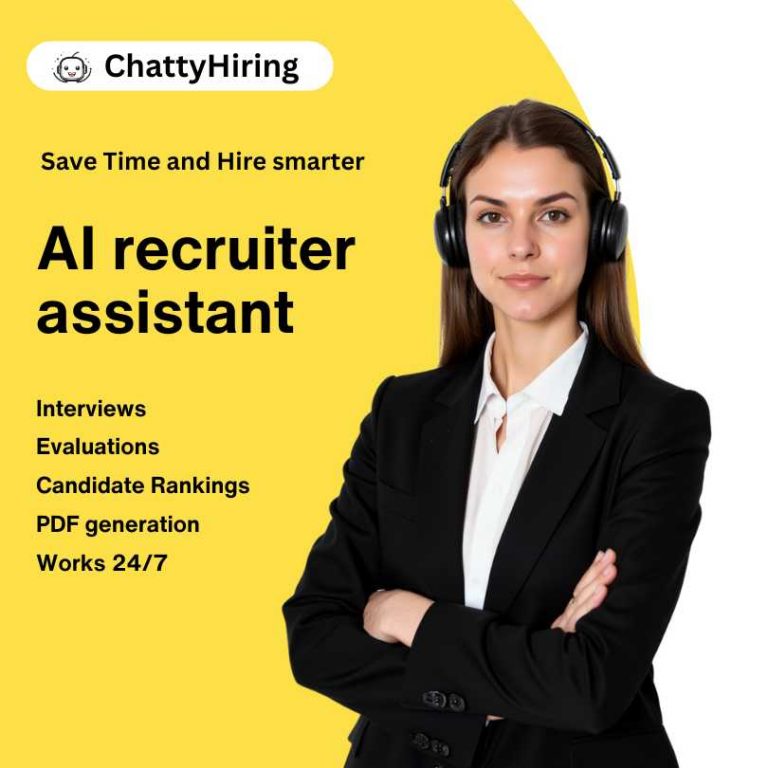Hiring for customer-facing roles is difficult because these jobs require a mix of strong communication skills, technical knowledge, and the ability to handle challenging situations. Many companies struggle to find candidates who truly fit these demands, especially in fast-moving sectors like retail and hospitality. Delays in traditional hiring processes also cause many good candidates to drop out before offers can be made.

Chatty Hiring helps solve these challenges by using roleplay exercises and WhatsApp interviews to make the screening process quicker and more interactive. This approach allows employers to see how candidates might perform in real situations early on. Automated candidate ranking also speeds up decision-making, making it easier to find the best fit without losing top talent to competitors.
By using technology to cut down on slow, outdated hiring steps, companies can fill customer-facing roles faster and with better results. This method not only improves hiring speed but also helps build a pool of ready candidates for future needs.
Key Takeaways
- Customer-facing roles need specific skills that are hard to find.
- Interactive interviews and roleplay give better insight into candidate abilities.
- Automating ranking helps companies choose faster and keep the best candidates.
Why Hiring for Customer-Facing Roles Is Challenging

Hiring for customer-facing roles involves several complex issues. Employers struggle to find candidates who meet skill demands, keep up with changing customer needs, and see these jobs as long-term career options. These challenges affect the quality of customer experience and business success.
Talent Shortages and High Demand
Customer-facing roles often have more job vacancies than suitable candidates. This talent shortage stems from high demand in retail, hospitality, and sales sectors. Many skilled workers leave due to low pay, stressful environments, and limited career progression.
The fast turnover means employers spend more time hiring and training new staff. Recruiting people who balance soft skills like empathy and communication with necessary technical skills is difficult. Finding candidates who possess both is a major hiring challenge.
Evolving Customer Expectations
Today’s customers expect fast, personalised service. Employees in customer-facing roles must handle diverse behaviours and quickly solve problems. This requires strong adaptability and emotional intelligence.
Companies need staff who can use technology efficiently, like point-of-sale systems, while maintaining friendly interactions. Failing to meet these customer expectations can harm loyalty and damage a company’s reputation. Keeping pace with evolving demands makes hiring more complex.
Perception and Career Growth Barriers
Many view customer-facing jobs as temporary or entry-level roles, which lowers application rates from experienced candidates. This perception limits the talent pool and makes it harder to attract motivated workers.
Lack of clear career growth opportunities also discourages applicants. If employees don’t see a path to advance, they are less likely to stay. Organisations must promote these roles as viable long-term careers to improve hiring outcomes and retain talent.
Key Qualities Required for Success in Customer-Facing Roles

Success in customer-facing roles depends on specific personal traits and skills. These include clear communication paired with empathy, the ability to solve problems quickly and effectively, and fitting well within the company’s culture. Each quality plays a vital role in how well a person deals with customers and represents the brand.
Communication and Empathy
Clear communication is essential when working directly with customers. This means speaking in a way that is easy to understand, using simple language, and adapting explanations to the customer’s level of knowledge. A successful employee listens carefully and responds politely, ensuring the customer feels heard and valued.
Empathy goes hand in hand with communication. Understanding the customer’s feelings and perspective helps to build trust and calm situations where the customer is upset. This connection often turns negative experiences into positive ones, showing the company cares about its customers. Empathy also supports patience and kindness, key traits for maintaining good relationships.
Problem-Solving Skills
Problem-solving skills are crucial for handling customer issues efficiently. Employees must think clearly under pressure and find solutions that satisfy both the customer and company policies. This includes prioritising tasks when multiple customers need help and managing time well.
Being resourceful is also important. When a problem is new or complex, the worker should show initiative by seeking guidance or using available tools to resolve the issue. Quick decision-making without sacrificing quality improves customer satisfaction and reduces frustration for both parties.
Cultural Fit for Customer Service Excellence
Fitting with the company’s culture means sharing the values and behaviours that drive great service. Employees who align with the brand’s mission and tone represent it authentically and consistently. This fit helps motivate the team to work towards the same customer care goals.
Cultural fit also includes embracing diversity and adapting communication to different customer backgrounds. A workforce that respects and understands diversity can deliver more inclusive service, enhancing the company’s reputation. When staff feel connected to the culture, they are more engaged and willing to go the extra mile in customer service.
Recruitment Obstacles in Retail and Sales Environments
Hiring for retail and sales roles often demands balancing quick hiring with finding the right candidates. This involves handling huge applicant numbers while ensuring employees fit well in fast-paced, customer-focused jobs. Seasonal spikes and frequent turnover add extra pressure.
Volume Versus Quality Trade-Offs
Retail and sales teams require many new hires quickly, especially when stores expand or during busy periods. This volume makes it hard to assess each candidate thoroughly. Hiring in a rush often leads to compromises on quality.
Focusing only on speed risks hiring people who lack vital customer service skills or sales instincts. Poor hires can raise turnover and hurt customer experience, costing time and money.
To manage this, solutions like candidate ranking help sort applicants by suitability based on skills and experience. Tools such as Chatty Hiring’s roleplay simulations offer realistic scenarios to test communication and sales ability before interviews. This approach helps improve quality without slowing down volume hiring.
Seasonal and High Turnover Challenges
Retail and sales roles face sharp rises in staff needs during holidays and promotions. These peak times require fast hiring of temporary workers. Seasonality creates unstable workforce size and often leads to overwork for regular staff.
High turnover is common in these sectors due to job stress, hours, and limited career paths. Employees frequently leave for better nearby jobs or due to poor management. This turnover means stores repeatedly spend resources on recruiting and training new workers.
Addressing this, Chatty Hiring uses WhatsApp interviews for quicker screening through familiar, accessible channels. Combined with candidate ranking, it helps focus on the best fits who are likely to stay. Regular use of roleplay also identifies those who thrive under pressure, reducing turnover risks during tough seasons.
How Chatty Hiring’s Roleplay and WhatsApp Interviews Address Hurdles
Chatty Hiring uses practical tools to tackle common problems in hiring for customer-facing roles. Their approach focuses on recreating real work situations and improving how candidates are tested, making the recruitment process more reliable and effective.
Simulating Real Customer Interactions
Roleplays by Chatty Hiring let candidates demonstrate how they handle actual customer situations. This method tests communication skills, problem-solving, and emotional control in scenarios similar to daily work challenges.
Candidates engage in conversations that mirror those with real customers, offering a realistic view of their abilities. It reveals how they respond under pressure and adapt to unpredictable questions. This live simulation is more accurate than standard interviews or resume reviews.
Using roleplay helps employers see which candidates can deliver good customer experiences consistently. It also highlights essential soft skills that traditional methods might miss, such as empathy and patience.
Enhancing Assessment Accuracy
WhatsApp interviews add speed and convenience to the hiring process while keeping assessment quality high. The app’s familiar interface encourages candidates to respond quickly and comfortably, leading to more genuine answers.
AI-powered chatbots conduct initial screenings by asking targeted questions and analysing responses. This reduces bias and ensures that only candidates who fit key job criteria move forward. Recruiters then review these insights to make better-informed decisions.
Combining WhatsApp interviews with roleplay results in a fuller understanding of each candidate. This dual method tests both technical skills and real-world interaction style, improving accuracy in ranking candidates for customer-facing roles.
Optimising Candidate Selection with Automated Ranking
Automated candidate ranking helps recruiters sort through many applications quickly and fairly. It allows hiring teams to focus on candidates who best match the job profile. This approach uses clear rules and data to improve decision-making and reduce common hiring errors.
Objective Evaluation for Better Hires
Automated ranking uses a set of defined criteria to score each candidate. These criteria often include skills, experience, education, and specific job requirements. The system analyses each CV deeply, not just keywords, to judge how well a candidate fits the role.
This objective evaluation means hiring teams spend less time on unsuitable candidates. They can prioritise those with the strongest match to the role. Automated ranking helps ensure that candidates are compared on the same basis, making the hiring process more consistent and focused.
Bias Reduction and Data-Driven Insights
Using automated ranking helps reduce unconscious bias because every candidate is reviewed against the same rules. This removes personal preferences or assumptions from the initial screening. By focusing on data, it supports making fairer and more transparent choices.
Recruiters also gain valuable insights from the rankings. They can see which skills or qualifications are most common in top-ranked candidates. This data helps improve job descriptions and hiring strategies over time. It also speeds up recruitment by delivering clear, actionable results.
Building a Future-Proof Talent Pipeline
Creating a strong talent pipeline means planning for future needs and developing staff so they can grow into critical roles. It involves making roles attractive and offering clear growth options. It also requires preparing employees with the right skills to meet evolving business demands.
Positioning Customer-Facing Roles as Strategic Careers
Customer-facing roles often suffer from high turnover because they are seen as temporary or low-skilled jobs. To build a future-ready talent pipeline, organisations must change this view. They should highlight these roles as vital to business success and focus on career development within them.
Clear career paths help show employees how they can advance from entry-level positions to leadership roles. Firms can use roleplay exercises and interactive interviews to identify candidates with strong interpersonal skills and growth potential. These tools help select individuals ready for strategic responsibilities rather than short-term tasks.
Upskilling for Long-Term Business Success
Investing in upskilling prepares customer-facing employees for future challenges. Training should cover both product knowledge and skills like conflict resolution, digital communication, and adaptability. This approach reduces turnover by increasing job satisfaction and performance.
Organisations can integrate tools like WhatsApp interviews for fast communication and candidate ranking systems to track progress. These help keep candidates engaged and make the hiring process more efficient. Upskilling also supports internal promotions by building leaders from within, strengthening the pipeline for long-term success.
-

A passionate advocate for the future of HR innovation. With expertise in leveraging AI to revolutionize recruitment processes, Carlos has a clear vision: empower HR teams while creating meaningful candidate experiences.
View all posts





